|
|
|
Sort Order |
|
|
|
Items / Page
|
|
|
|
|
|
|
| Srl | Item |
| 1 |
ID:
137366


|
|
|
|
|
| Summary/Abstract |
This Xinjiang Class is a four-year, national-level boarding school program established by the Chinese Communist Party (CCP) in the year 2000. The overarching aim of the program is clear: the CCP intends to train a core group of young Uyghurs who have internalized the ideals of the Party. This article, which is based on interviews and regular interaction with over 60 graduates of the Xinjiang Class, casts doubt on whether the boarding schools have been effective in ‘interpellating’ young Uyghurs as compliant members of the Chinese Nation (Zhonghua minzu). This article contends that Uyghur graduates of the Xinjiang Class have instead embraced a non-Chinese ethno-national identity—an identity bound by Central Asian and Islamic cultural norms—and have largely rejected the Zhonghua minzu identity.
|
|
|
|
|
|
|
|
|
|
|
|
|
|
|
|
| 2 |
ID:
137365
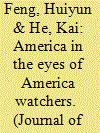

|
|
|
|
|
| Summary/Abstract |
Based on an original survey conducted in the summer of 2012 in Beijing, we examine how China's America watchers—IR scholars who work on US-China relations—have viewed China's power status in the international system, US-China relations and some specific US policies in Asia. Our survey shows that almost half of the survey participants thought that America would remain the global hegemon in the next ten years. Meanwhile, a large majority was also optimistic that China is a rising great power, especially in the economic sense, in the world. More than half of the respondents saw Asian military issues, such as the South China Sea issue, as the most difficult problem between China and the US.
|
|
|
|
|
|
|
|
|
|
|
|
|
|
|
|
| 3 |
ID:
137370


|
|
|
|
|
| Summary/Abstract |
This article systematically examines the perceptual dimension of US–China–ASEAN relations. It specifically focuses on Chinese perceptions of American intentions in Southeast Asia, Chinese perceptions of the impact on China of the US's return to Southeast Asia, and suggestions of the Chinese scholarly community as to how China should respond to the US's return. Chinese scholars believe that the US returns to Southeast Asia for a variety of reasons and one of the most important is to manage the rise of China, and that the US's return has both positive and negative impacts on China's interests and the negative impact outweighs the positive. Overall, Chinese perceptions of the US return, especially Chinese scholars’ suggested response, indicate that Chinese scholars have internalized the strategy of peaceful rise which would give us added confidence that China is seriously committed to this strategy. If both the US and China stick to their relevant commitments, the rise of China, unlike that of most great powers in the past, would quite likely be peaceful.
|
|
|
|
|
|
|
|
|
|
|
|
|
|
|
|
| 4 |
ID:
137368
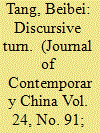

|
|
|
|
|
| Summary/Abstract |
This article examines local governance and citizen participation in China through unstructured public deliberation. Case studies from two urbanized villages show that unstructured, informal public deliberation potentially leads to more autonomy and diverse channels for pursuing citizens' appeals at the local level, along with increased consideration given by local government to grassroots requests relating to practical governance matters. Although taking place outside formal political institutions, unstructured public deliberation can exert influences on policy or decision-making inside government organizations through well-coordinated transmission mechanisms between the public and the local government. During this process, well-resourced community organizations and actors play a vital role through their bridging functions to produce dynamic relations of deliberative governance. This bridging role serves to deliver deliberative outcomes from the public sphere to the decision-making authorities, and it also includes the collection of feedback on policy as well as the means to negotiate for policy adjustment by facilitating a policy implementation process.
|
|
|
|
|
|
|
|
|
|
|
|
|
|
|
|
| 5 |
ID:
137369
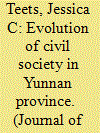

|
|
|
|
|
| Summary/Abstract |
This article examines the evolution of the Yunnan model of civil society management, and through a pretest–posttest research design, finds that new regulations in 2010 create a larger role for the local state in developing civil society. These changes bring the Yunnan model closer to the more supervised model of social management pioneered by Beijing and away from the more autonomous model exemplified by Guangdong. This has important implications for the future regulation and development of civil society as the central government debates adopting one of these models as a national system of social management. While both the Guangdong and Beijing models encourage relaxing registration requirements, the social management model in Yunnan develops new channels for state guidance of civil society such as government training, funding, and project collaboration or supervision.
|
|
|
|
|
|
|
|
|
|
|
|
|
|
|
|
| 6 |
ID:
137363
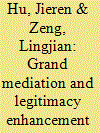

|
|
|
|
|
| Summary/Abstract |
China has seen numerous instances of collective resistance in recent years. Suppression cannot stop popular resistance. It is also hard to solve all problems through the existing judicial system, administrative method or by social means. Based on a case study in Sichuan, this article studies the Grand Mediation (GM) mechanism in Guang'an as one of the ways in which the Chinese government chooses to build institutions and channel social grievances. GM is successful in containing social conflicts and helping the state to garner legitimacy by reducing people's hostility towards local government, which could enhance the CCP's legitimacy, whose paramount goal is to maintain political stability and social harmony.
|
|
|
|
|
|
|
|
|
|
|
|
|
|
|
|
| 7 |
ID:
137367
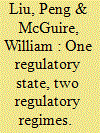

|
|
|
|
|
| Summary/Abstract |
As China proceeds with a process of urbanization unprecedented in human history, it maintains an urban-biased governance regime in many areas, including food safety regulation. Using secondary data and interviews with officials from the Changping district in Beijing, this article systematically defines the main characteristics of China's dual food safety regulation regimes, highlighting differences between urban and rural areas in four dimensions: policy structure, funding source, staff structure and resource allocation. This article also provides an explanatory framework to understand this dual regime's development and persistence from a neo-institutionalism perspective. Three main explanatory variables are advanced: historical legacy, dual incentive structures, and dual economic and industrial patterns. While China's urbanization process and governance structure, including the food safety regulatory regime, are not complete by Western standards, we emphasize this problem is best understood by examining China's unique socioeconomic and cultural context.
|
|
|
|
|
|
|
|
|
|
|
|
|
|
|
|
| 8 |
ID:
137364


|
|
|
|
|
| Summary/Abstract |
Theories that explain post-Mao China's economic success tend to attribute it to one or several ‘successful’ policies or institutions of the Chinese government, or to account for the success from economic perspectives. This article argues that the success of the Chinese economy relies not just on the Chinese state's economic policy but also on its social policies. Moreover, China's economic success does not merely lie in the effectiveness of any single economic or social policy or institution, but also in the state's capacity to make a policy shift when it faces the negative unintended consequences of its earlier policies. The Chinese state is compelled to make policy shifts quickly because performance constitutes the primary base of its legitimacy, and the Chinese state is able to make policy shifts because it enjoys a high level of autonomy inherited from China's past. China's economic development follows no fixed policies and relies on no stable institutions, and there is no ‘China model’ or ‘Beijing consensus’ that can be constructed to explain its success.
|
|
|
|
|
|
|
|
|
|
|
|
|
|
|
|
| 9 |
ID:
137362
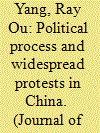

|
|
|
|
|
| Summary/Abstract |
Existing studies of collective actions in China pay most attention to frequent but localized protests, but such protests are less likely to deeply drive China's political and social prospect. By contrast, widespread protests are more likely to affect the Chinese Communist Party's authority and policies once they emerge. The goal of this article is thus to probe the onditions under which a widespread protest can happen in China today. This article proposes four necessary conditions grounded in the political process model and tests them by explaining the successful outbreak of the 2010 labor protest. Identifying these conditions helps us understand and predict the political and social development of China.
|
|
|
|
|
|
|
|
|
|
|
|
|
|
|
|
| 10 |
ID:
137361
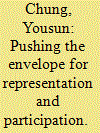

|
|
|
|
|
| Summary/Abstract |
This article discusses the evolution of urban homeowner activism in two senses: internally (growth through internal diversity) and externally (advancement in interaction with the state). The combination of these two aspects has directed the activism toward the expansion of its boundaries, as well as advanced representation and participation. Based on cumulative fieldwork carried out since 2007, I discuss two homeowner organizations in Beijing as core cases. Rights activism by homeowners has grown beyond the state-set boundaries of individual neighborhoods and has begun deploying innovative strategies and adapting existing institutions for its own use. Rights awareness and manifestation by social actors has evolved continuously. This evolution suggests the emergence of a complex interplay between state and society which goes beyond a confrontational or lopsided relationship.
|
|
|
|
|
|
|
|
|
|
|
|
|
|
|
|
|
|
|
|
|